YANGON—Travelling north from downtown Yangon, the urban landscape gradually grows a greener buffer, buildings become more modest and the pace of life seems slower. On one tree-lined street in North Dagon Township, we enter a small green plot with a pretty, two-story building looking onto rows of green leaves, small crops, polytunnels and a smattering of marigolds.
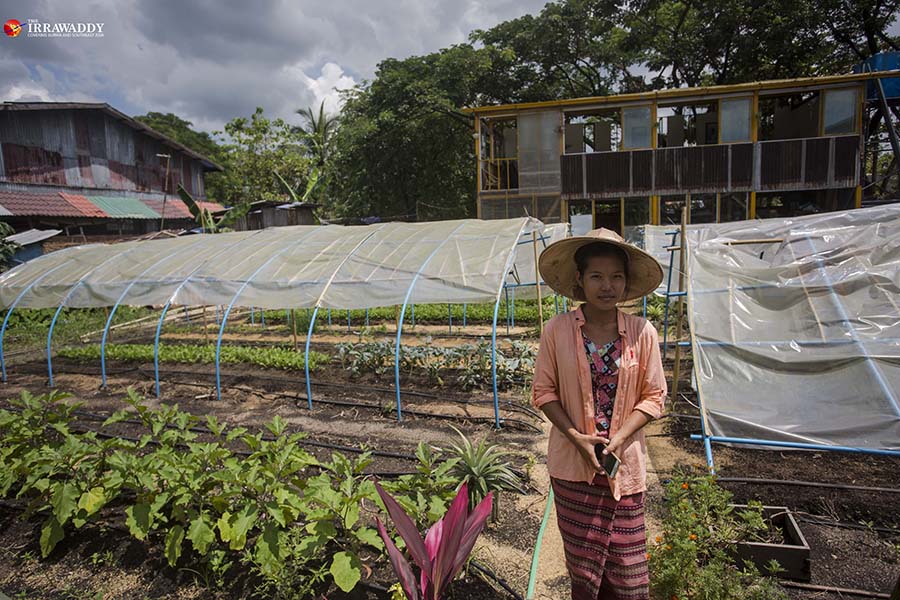
Caity, the Australian lady who co-founded Kokkoya Organics, emerges from behind a laptop on the ground floor of the “treehouse” as voices of workshop participants emanate from upstairs.
Kokkoya is an urban farm on a quarter of an acre operating as a social enterprise training a staff of young women and growing organic vegetables for sale to the local market through a community supported agriculture (CSA) system. Caity co-founded the farm with Mandalay-native Sophia, in September 2017.
Community-supported agriculture means subscribers pay a monthly, seasonal or annual fee which supports the farm and both reaps the benefits of a strong harvest and bears the brunt of a bad harvest while allowing the farmers a stable income and a reliable market.
“We find members who subscribe for a month of vegetables. People are very understanding and are part of the community that really understands the farm. Even if something bad happens, we’d still have money coming in that month,” said Caity.
Through experimentation and adaptation, the farm has been able to grow organic vegetables, fruit, herbs and microgreens year-round, focusing on fast-growing organic crops with good market prices. Currently there are pumpkins, eggplant, okra, ginger, rocket and roselle as well as some microgreens which are bagged and delivered to or picked up by around 30 subscribers weekly.
Subscribers’ understanding is imperative for the success of the project: most consumers are used to getting any produce they want, year round, but as Caity says, “this actually how we are meant to eat—with the seasons.” The community is growing as we approach winter, the peak growing season, with 30 subscribers in September, 40 in October and a projected 50 monthly from November.
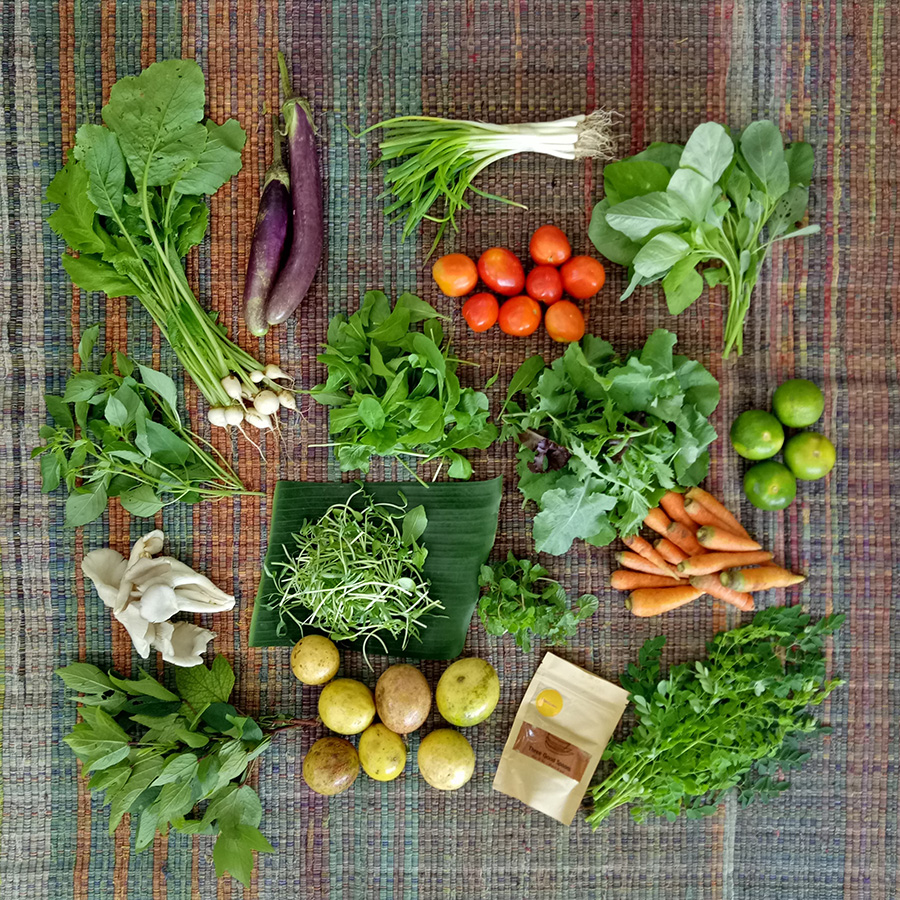
“It is challenging [for subscribers]: instead of shopping for whatever you want, you are given the best that we have that week, all on one day. People need to be a bit flexible and creative in how they plan meals. But the reward is you get the most beneficial vegetables.”
Kokkoya also works to support other small organic farmers by incorporating their produce in veggie boxes. They can use their brand and membership plan to connect the farmers with the right market.
The process of establishing an organic farm has taken a lot of physical effort, patience and trial and error. Unlike many farms, Kokkoya produces crops year-round, dealing with new challenges every season: during the monsoon season, the soil was washed out so they had to build polytunnels. Fungus grew on crops that couldn’t dry out. Pest attacks can ruin crops at any time of the year. But Caity isn’t fazed.
“It’s a process of researching, trying things out, testing and adapting and sometimes it works. We are constantly learning and getting better at it, slowly,” Caity said. “We’ve done a lot of experimenting!”
From country to country and person to person, standards for ‘organic’ vary vastly and Myanmar is no different. While the government does have definitions for organic certification, it largely applies to crops grown in bulk for export. Kokkoya produce is organic because Caity and her female farmers don’t use any chemicals, pesticides, fertilizers, even organically-certified ones on the crops. In fact, the only thing sprayed at Kokkoya is water.
“We’re not really interested in being certified and this is why we are in the city—we want people to connect with the farm and the farmer who grows their food. We feel we are certified because we know our consumers, we sell directly and there is a trust. They can come and check our farm at any time.”
The farm has received criticism from some of their more purist observers: their use of plastic tunnels to defend the crops from monsoon downpours was once a source of criticism; someone else said that the farm couldn’t be organic because it is located in an urban area; while another person said wearing rubber boots on the farm is an un-organic practice. But Caity is unwilling to take advice from anyone who has not tried organic farming here for themselves.
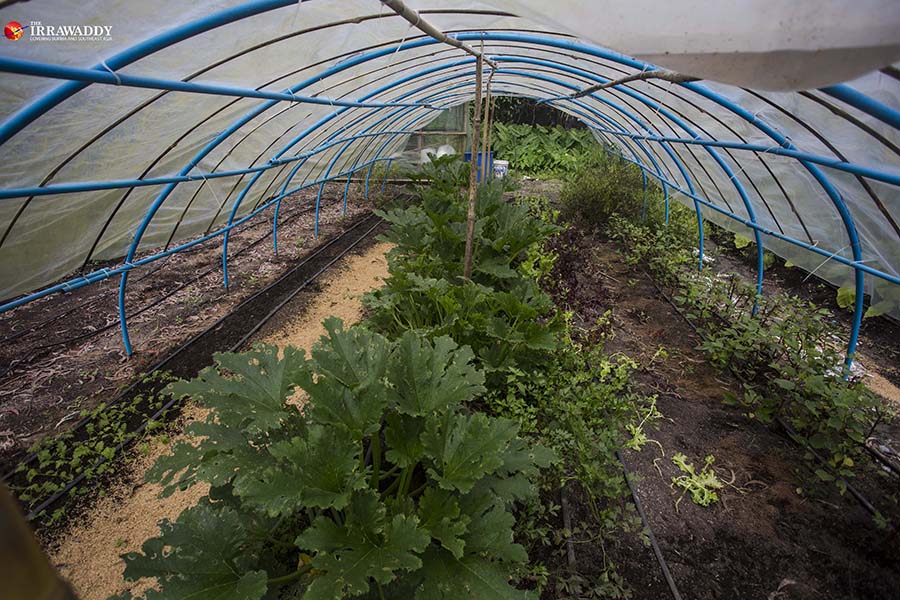
The soil on the farm is essential for the success of Kokkoya’s crops and is treated like a living ecosystem. It is not dug up or exposed in order to keep the worms and microorganisms and preserve a balance in the ecosystem.
“Plants come and go quickly but the soil will always be there,” Caity said. “We treat soil as a living, breathing city and we protect it as best we can and give it what it needs.”
Meanwhile, indoors, such a project replies hugely on non-farming elements like marketing, business development and, to Caity’s distaste, a huge amount of administrative work.
“You can’t just grow beautiful radishes. You need to have a market and people who buy them.”
As a social enterprise, Kokkoya is not only about farming, but also training and educating people on organics. Workshops and events held on the farm are an important source of income for the project. The ‘Monsoon Workshops’ series brought people to the farm to learn about aquaponics, permaculture, healthy meal planning, hygiene and apartment gardening. The ongoing ‘Good Supper’ series has brought award-winning chefs and experts in veganism, superfoods and organic poultry to those gathered in the treehouse.
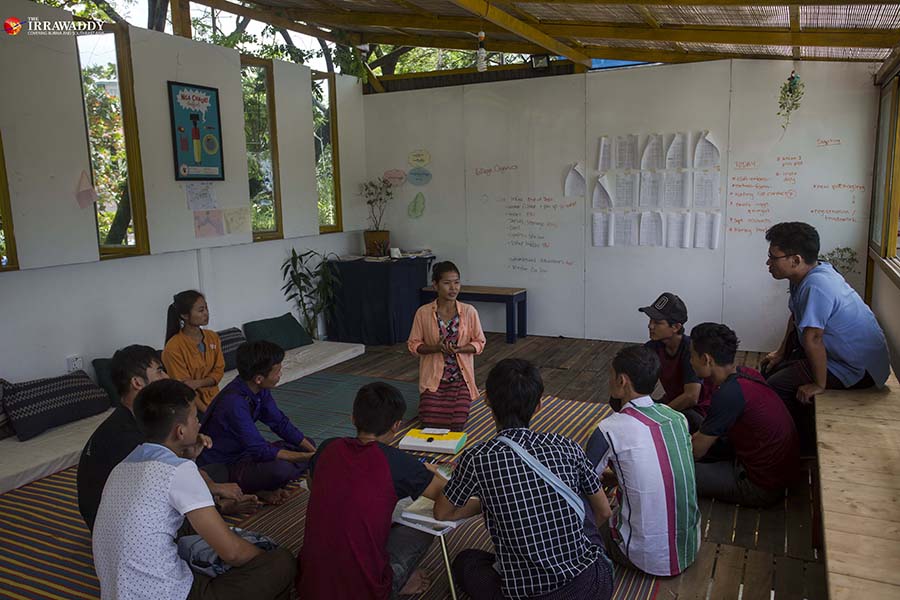
When not in the vegetable beds, farmers Nilar, Catherine and Khu Pawe get training to help develop a wide range of skills like marketing, business development and English. In fact, the end goal is for these three farmers to be able to develop their own program or a farm similar to Kokkoya in their own communities.
Currently, organic farmers in Myanmar lack good advice and technical support, and good organic seeds are difficult to find. An added challenge is that farming practices vary hugely from region to region. Part of the objective of the project to use the results of the team’s tireless research, experimentation and trails and errors to create a database of information to make it easier for others in the future.
Challenges aside, however, Caity feels grateful to be able to work on a beautiful farm on a project she and the others are passionate about. At the end of the day, the rewards of running an organic urban farm in Yangon are simple: it’s that first sign of a sprouting green.
“One of the most rewarding things is growing food and every time a new seed comes up, it makes all the failures and tests worth it,” said Caity.
She recalls the highlight of the project which came late last year after just a few months of growing when the team was able to deliver the first veggie boxes:
“That was after two months of pushing, and hoping and not knowing if it would work. Sending out those first veggies was the biggest high.”
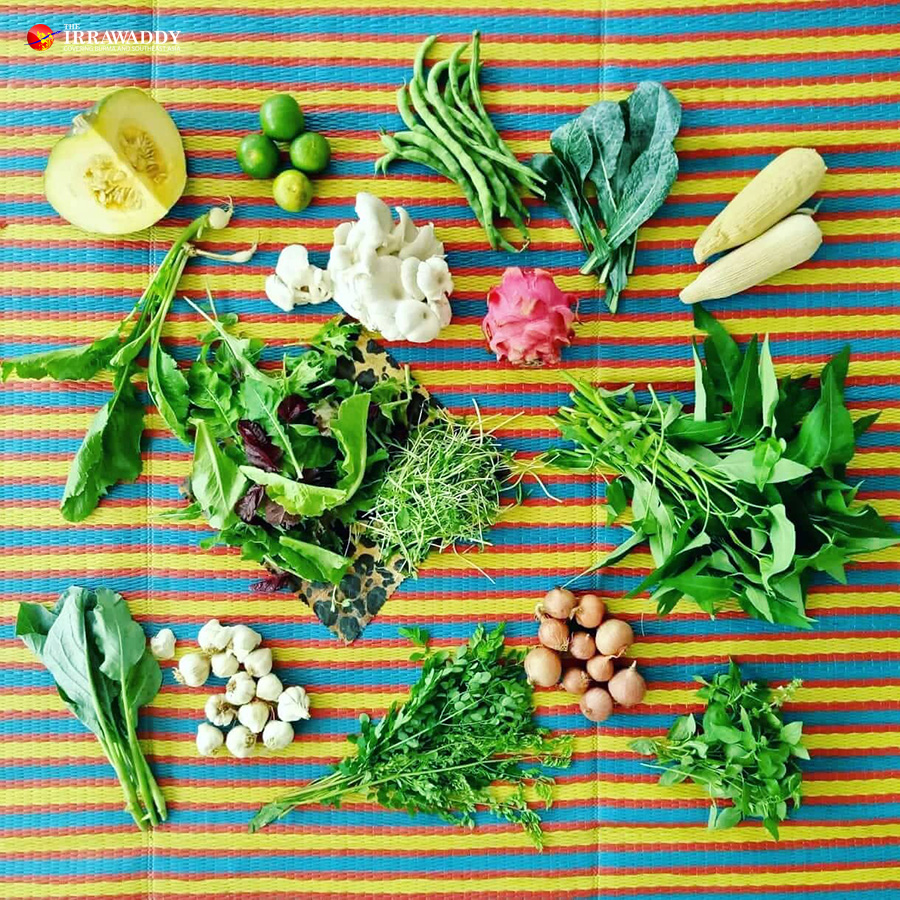
Community members can sign up to a subscription to receive deliciously natural vegetables weekly and support the farm through the Kokkoya Organics website. The organic goods can also be bought at Yangon Farmers Market which takes place on Saturday mornings in Karaweik Garden at Kandawgyi Lake.
An exciting schedule of workshops and other events at the farm is updated regularly on the website and the Kokkoya Organics Facebook page. The Farm Tour and Farm to Brewery Tour, which finishes with craft beer tasting at nearby Burbrit Brewery, are fantastic, alternative activities to experience in a green slice of Yangon. However you get involved, you’re helping Kokkoya to promote healthy growing practices and spreading the organic love.
“Our main aim and goal is to have more organic farming in Myanmar and so we will always try to help others grow organically and help educate customers to buy organic, and support the farmers.”

















